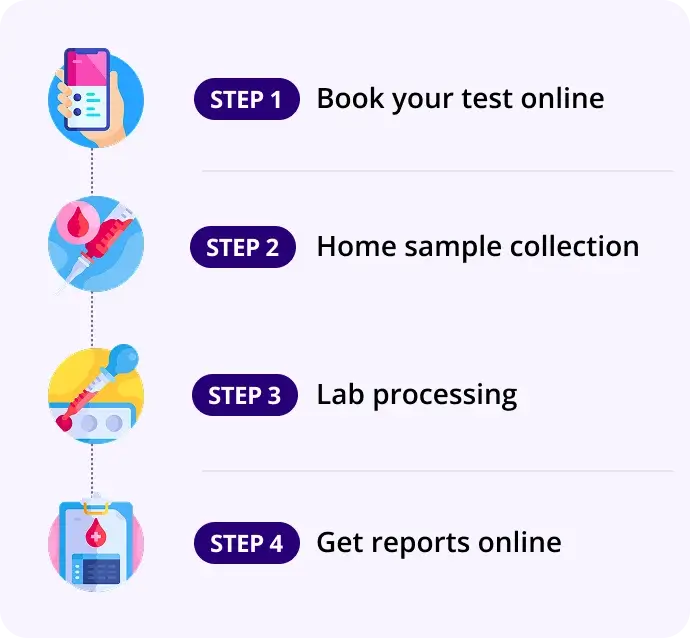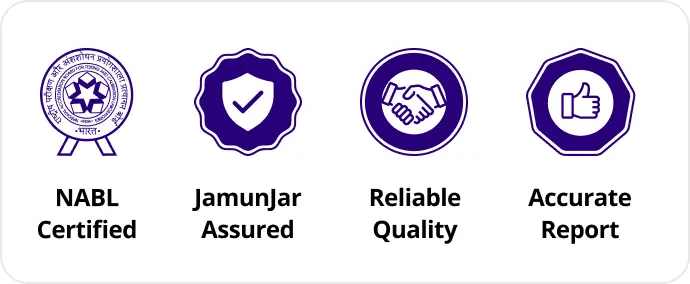Search for
Cytomegalo Virus (CMV) - IgG
Bacterial/ Viral
Report in 4Hrs
At Home
No Fasting Required
Details
Cytomegalovirus (CMV) is a common herpesvirus that can infect people of all ages. The CMV IgG test detects IgG antibodies against CMV in the blood
₹249₹660
62% OFF
FREE:
Ai Insights
Cytomegalovirus (CMV) - IgG Antibody Test
- Why is it done?
- Test Purpose: Detects IgG antibodies against Cytomegalovirus (CMV), indicating past or current CMV infection and immune response status
- Primary Indications: Screening prior to immunosuppressive therapy, organ/tissue transplantation, or chemotherapy; evaluating immunity status in immunocompromised patients; investigating symptoms suggestive of CMV infection (fever, fatigue, malaise); determining serostatus before pregnancy; assessing congenital infection risk
- Typical Timing: Pre-transplant evaluation, routine screening for healthcare workers or blood donors, preconception counseling for women of childbearing age, when immunosuppressive therapy is planned, investigation of atypical symptoms in immunocompromised patients
- Normal Range
- Reference Values: Negative/Non-Reactive: <0.90 Index or <1.0 AI (varies by laboratory and assay method)
- Result Interpretation: Negative (Non-Reactive): No detectable CMV IgG antibodies; indicates no prior CMV infection or immunity absent. Positive (Reactive): ≥0.90 Index or ≥1.0 AI; indicates previous CMV infection and immune response present. Borderline: 0.90-1.10 (may require repeat testing or additional evaluation)
- Units of Measurement: Index (AI), Absorbance Index, or qualitative positive/negative; some labs report IU/mL (International Units per milliliter) or mg/mL
- Clinical Meaning: Normal (Negative) = No previous CMV exposure or infection; no specific immunity. Abnormal (Positive) = Previous CMV infection has occurred; indicates established immunity and protection against reinfection in most immunocompetent individuals
- Interpretation
- Negative IgG Result: No previous CMV infection; susceptible to primary infection; no existing antibody-mediated immunity. If IgM is also negative, primary infection is unlikely. In transplant patients, negative serostatus may require antiviral prophylaxis if receiving organ from positive donor. Important for healthcare workers and pregnant women
- Positive IgG Result: Previous CMV infection confirmed; indicates past exposure and immune response. High antibody levels suggest either recent infection or chronic latent infection. In immunocompetent individuals, positive IgG with negative IgM indicates past infection with low reactivation risk. May indicate latent infection that could reactivate in immunocompromised states
- Positive IgG with Positive IgM: Suggests acute or recent primary CMV infection, particularly if IgG level is rising or IgM is high. Requires confirmation with IgM testing and possible viral culture or PCR. Higher risk for disease transmission and clinical manifestation of active infection
- Factors Affecting Results: Immunosuppression (may show false negatives or delayed antibody response); acute infection timing (antibodies may not be detectable in first 7-10 days); laboratory assay variation; cross-reactivity with other herpesviruses (rare); severe immunodeficiency affecting antibody production
- Clinical Significance: IgG positivity indicates exposure and establishes baseline immunity status. Results guide prophylaxis decisions in transplantation (matching donor/recipient serostatus). In pregnant women, positive IgG with negative IgM suggests no acute infection. Serial IgG levels may indicate reactivation in immunocompromised patients. Approximately 40-80% of adults worldwide are IgG positive, varying by geographic region and socioeconomic status
- Associated Organs
- Primary Organ Systems Involved: Immune system (primary); hematopoietic system (bone marrow and blood cells); lymphatic system; can involve virtually any organ system during active infection or reactivation
- Diseases Associated with Abnormal Results: CMV mononucleosis-like syndrome; CMV retinitis (particularly in AIDS patients with CD4 <50); CMV colitis with diarrhea and bleeding; CMV esophagitis; CMV pneumonitis; CMV encephalitis and ventriculoencephalitis; CMV hepatitis; CMV vasculitis; congenital CMV infection in neonates; transplant rejection or graft dysfunction; post-transplant lymphoproliferative disorder (PTLD)
- High-Risk Patient Populations: HIV/AIDS patients (especially CD4 <50 cells/mm³); solid organ and bone marrow transplant recipients; patients on chronic immunosuppressive therapy; neonates with congenital infection; pregnant women; critically ill patients; healthcare workers with frequent exposure
- Potential Complications: Blindness from retinitis if untreated; severe gastrointestinal bleeding from colitis; respiratory failure from pneumonitis; neurological impairment from encephalitis; graft loss in transplant patients; maternal-fetal transmission in pregnancy leading to congenital abnormalities (microcephaly, hearing loss, developmental delays); secondary infections in immunocompromised hosts
- Follow-up Tests
- Recommended Follow-up Tests: CMV IgM antibody testing (to assess for acute infection); CMV PCR/viral load (quantitative DNA testing to detect active replication); CMV culture (confirmation of active infection); CMV pp65 antigenemia assay (early detection of reactivation); Repeat IgG testing (to assess for rising titers indicating reactivation)
- Based on Clinical Scenario: Pre-transplant: Donor CMV serostatus testing, recipient baseline immune assessment. Post-transplant: Periodic CMV PCR surveillance (frequency depends on protocol and serostatus matching). Pregnant women: Ultrasound evaluation, amniocentesis with CMV PCR if concerns for congenital infection. Immunocompromised: CD4 count, baseline ophthalmologic exam, liver function tests
- Supplementary Testing: Comprehensive metabolic panel (to assess for hepatitis); complete blood count (lymphocytosis in mononucleosis-like illness); liver function tests; imaging studies as clinically indicated; ophthalmology consultation for retinitis assessment
- Monitoring Frequency: Post-transplant: Weekly to monthly CMV PCR depending on protocol. Acute infection: Daily to weekly monitoring of viral load. Prophylaxis monitoring: Per institutional guidelines. Immunocompromised with CD4 <50: Regular surveillance every 4-8 weeks or per clinical protocol
- Fasting Required?
- Fasting Requirement: NO - Fasting is not required for CMV IgG testing. This is a serology/antibody test that is not affected by food or fluid intake
- Patient Preparation: Patient may eat and drink normally before the test; no special diet restrictions; no fasting period required; no bowel preparation needed
- Medications: Continue all regular medications as prescribed; no medications need to be withheld. Antiviral therapy (acyclovir, ganciclovir, valganciclovir) does not interfere with serologic testing and should not be discontinued
- Sample Collection: Simple venipuncture to collect 5-10 mL blood sample; serum tube (typically gold-top or red-top SST); no special handling required beyond standard lab protocols; samples stable at room temperature for several hours
- Timing Considerations: Test can be performed at any time of day; no time-dependent factors affect antibody detection; optimal results when specimen collected at least 7-10 days after symptom onset (allows antibody development if acute infection suspected); pre-transplant testing should be done prior to immunosuppression initiation
How our test process works!

